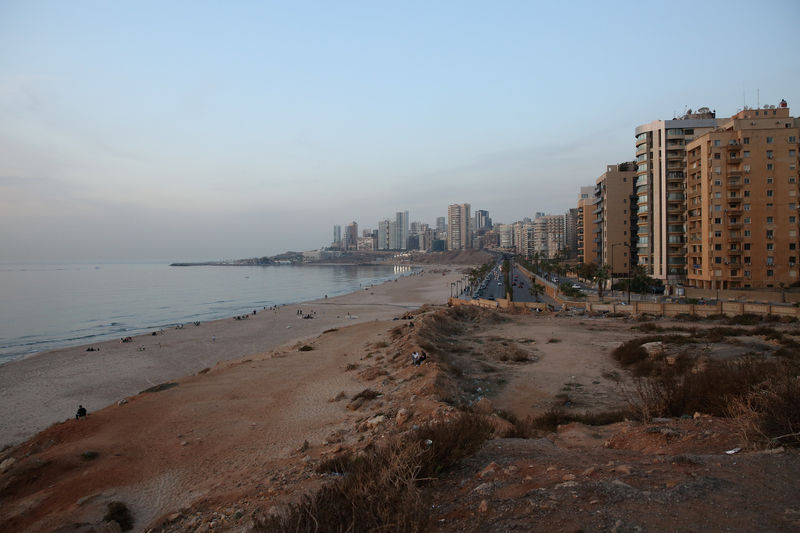By Sally Hayden
BEIRUT (Thomson Reuters Foundation) - Construction of a new luxury resort on Beirut's waterfront could enclose the city's last free public beach, leaving only wealthy residents who can afford lofty daily fees to enjoy the Mediterranean shore.
The battle for Ramlet al-Baida beach on the Lebanese capital's highly developed shoreline is at the center of the latest conflict between residents and municipal authorities.
It follows tensions last year over the closure of urban landfills and the continuing accumulation of garbage on the city's peripheries.
Locals say Beirut could become the first Mediterranean city without a beach open to the public after developer, Achour Development, began building its Eden Bay resort, scheduled to open in 2018.
During the most recent protest at the building site last weekend, protesters were met with a heavy police presence.
"People have become numb," said Bana Kadi, a demonstrator from Beirut. "It's terrible. The beach belongs to the public and belongs to the people, which is the way it should be legally."
Kadi said Beirut's coastline and beaches are already polluted by sewage and it was often impossible for residents to swim safely.
"Now we can't even enjoy the shore because there are no public spaces, and a city without public spaces is a city that becomes suffocated and eventually dies."
The development will cover around 5,000 square meters - larger than an average football field - on the southern end of the beach. Achour Development's website describes it as a "prime spot on the seafront that ensures that bustling city life remains outside the gated community".
Many resorts built on Beirut's predominantly high-rise waterfront charge up to $20 a day for access to beaches and facilities. The cheapest day rate is $10.
"We all grew up playing football on Ramlet al-Baida or just coming here to swim," said Elias, who did not give his surname.
"It's not first time that the public beach has been taken for investments," he said. "I think it's important that we don't let it happen again and again."
CITIZEN PROTEST
Residents and grassroots organizations have led several protests in recent months to highlight the loss of public open spaces, parks and beaches in Beirut.
In the May municipal elections, a grassroots group, Beirut Madinati (Beirut My City) campaigned strongly on protection of local parks, public amenities and services.
The group also campaigned for the protection and preservation of Ramlet al-Baida beach as public property for all, citing an order issued in 1925 which states that beaches cannot be bought or sold.
Achour Development directed the Thomson Reuters Foundation to the company lawyer who did not respond to requests for comment.
Construction on the south end of the beach was approved by Beirut's governor Ziad Chebib in September. The area is now patrolled by police and blocked to the public.
The construction area takes up a section of the south end of the beach, though the main expanse is so far untouched.
The municipal government issued a statement on Nov. 15 stating the land earmarked for the resort had always been deemed private and that the remaining beach would not be encroached on.
The building site was located "outside the premises of the public beach and more than 300 meters south of it", it said.
CITY PRESSURES
Many joining protests over the beach development said they had also taken part in last year's garbage protests. They said poor public services and over-development were symptomatic of a dysfunctional political system.
Parts of Beirut face daily power cuts, they said, as the city is unable to generate enough electricity for its population of more than one million, while the crisis over trash services has yet to be resolved.
Lebanon has just emerged from a 29-month period of political instability. Michel Aoun was elected president by parliament in October, ending a political stalemate that had left the post empty for more than two years.
The nation's infrastructure has also been overwhelmed by the arrival of more than one million Syrian refugees.
Uncertainty over the interpretation of laws governing public land has added to confusion over the future of the beach at Ramlet al-Baida, lawyers say.
In Lebanon, any coastal area touched by waves is deemed public land although arguments over the detail of this are long running, they say.
"It's the general problem of public spaces. Drive up the whole coast and you can see there's a violation of the coast law; there are already hotels that are constructed on the beach," Marwan Maalouf, a lawyer, said.
Maalouf said activists are building a legal case against the new beach development, which will include aerial photos showing that the blocked-off area was once on the shoreline.
ENVIRONMENTAL CONCERNS
Other activists involved in the anti-development campaign say their biggest concern is the environmental impact of the proposed resort.
Rima Tarabay, vice-president of environmental campaign group, Bahr Loubnan (See Lebanon), said the loss of sands would lead to damaging erosion.
Tarabay fears what she described as "ecocide: killing ourselves, not by bombs and by war and by creating pollution".
Demonstrator Kadi said many residents had local business interests and would be reticent about speaking out against the privatization of public spaces and beaches.
"The average citizen is being very much hurt by what's happening yet he's also concerned with keeping food on the table."
Beirut governor Ziad Chebib did not respond to requests for comment.
